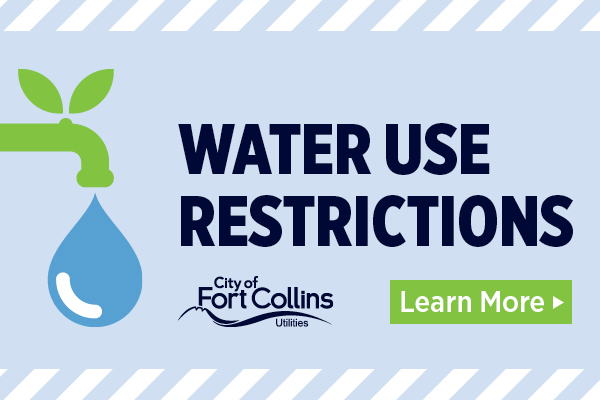
As the City of Fort Collins urges the community to reduce outdoor use of treated water through October and November, Colorado State University has curtailed all landscape irrigation that uses domestic water and has voluntarily reduced raw water irrigation as well.
The citywide push for an early shift to winter levels of water use – including water use restrictions – is in support of a maintenance project called the Horsetooth Outlet Project, coupled with concerns about drought conditions and possible effects on water quality from the Cameron Peak Fire. The watering restrictions on treated water do not apply to CSU raw water or other raw water irrigation in Fort Collins, and certain other exceptions which must be registered with the city.
CSU Raw Water
As part of CSU’s nationally recognized commitment to sustainability, the university irrigates turf areas – such as intramural fields – and other landscaping with raw water which is stored in College Lake. The Colorado State University Raw Water Utility has provided non-potable irrigation water to the CSU Foothills, Main and South Campuses since 1966. Non-potable water from this utility is used to irrigate more than 98% of CSU’s 250 acres of irrigated landscapes and accounts for approximately 75% of all water consumption by CSU at the Larimer County campuses.

“When people see the irrigation running on campus they’re seeing a raw water system that is a cornerstone of the water conservation strategy on our campuses,” said University Planner Fred Haberecht. “This fall, along with shutting down any use of treated water as part of the current rules to reduce water use in the city, we’re also making an extra push to reduce use of our raw water as we head toward winter even as we have adequate water in College Lake and it’s not part of the city system directly impacted by HOP, drought and fire concerns.”
Project planners say the Horsetooth Outlet Project is necessary to repair and upgrade the outlet at the Soldier Canyon Dam which supplies water to more than 220,000 residents and businesses. Work on the project is planned to last 30-45 days beginning in mid-October. The autumn timing is intended to decrease impacts to customers and landscaping while also allowing time for the work to be completed before winter weather sets in.
Tracking progress
Since restrictions began October 1, the city has seen a drop in water use that aligns with the goal of cutting from summer use levels of 35-40 million gallons per day down to winter levels of 13-15 million gallons per day. The city’s HOP webpage includes a “goal post” plot where community members can track progress in reducing demand for treated water.
“We have seen a decrease in water use since the restrictions began, but we still need the community’s help through October and November,” said Alice Conovitz, water conservation analyst with Fort Collins Utilities. “Small actions can make a big difference. If we all do our part, we can make the most out of our water resources during HOP and the continued dry weather.”
“When people see the irrigation running on campus they’re seeing a raw water system that is a cornerstone of the water conservation strategy on our campuses,” said Fred Haberecht, University Planner. “This fall, along with shutting down any use of treated water as part of the current rules to reduce water use in the city, we’re also making an extra push to reduce use of our raw water as we head toward winter even as we have adequate water in College Lake and it’s not part of the City system directly impacted by HOP, drought and fire concerns.”